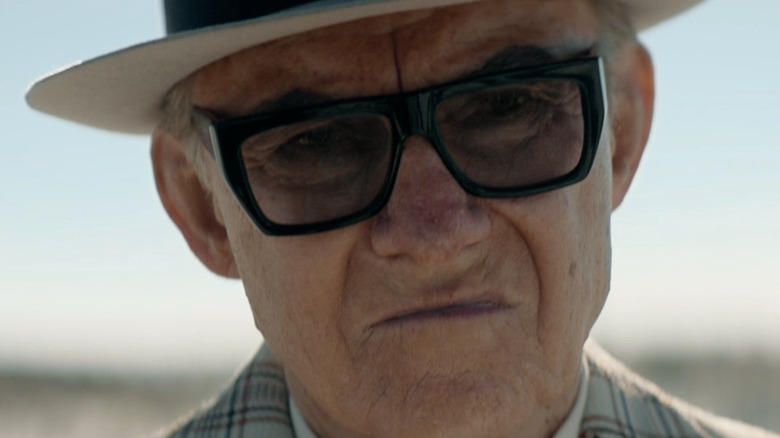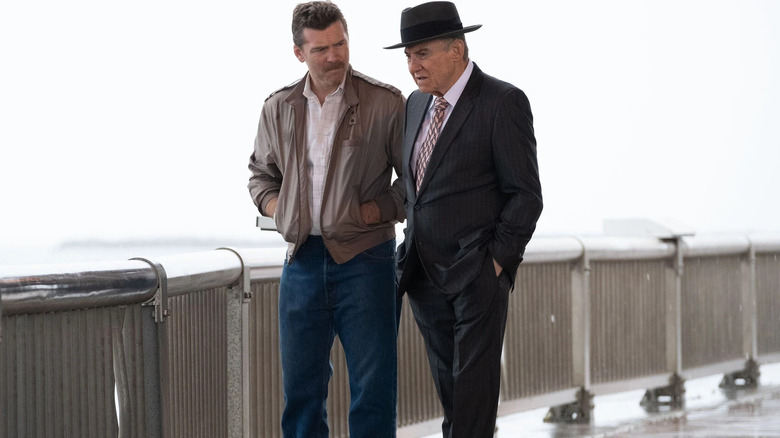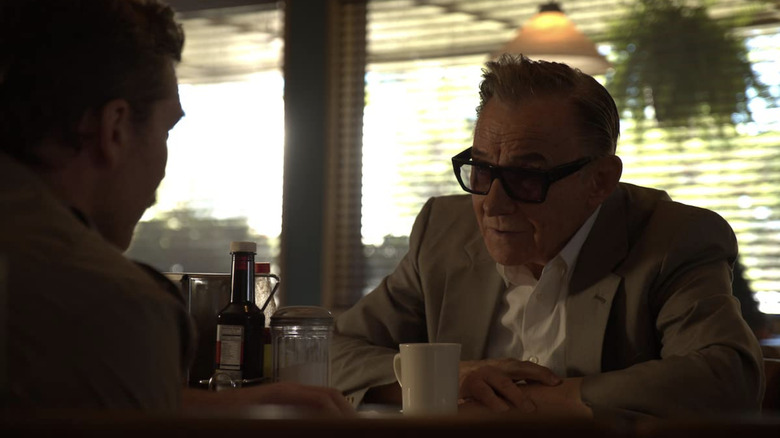Lansky Review: Leave The Script, Take The Keitel
A film for mob movie junkies, "Lansky" is a deep cut. It shines a spotlight on a character they know, stars an actor they love, and hits all the familiar beats. A lack of cohesion and blurred lines of reality keep the film from taking over its territory; however, the flick has moments when it takes firm hold of its genre like a boss.
Far and away, the best scenes in "Lansky" are whenever Harvey Keitel is onscreen. Meyer Lansky has been a character in about a dozen movies, half that many TV shows and another dozen books, but almost always as a peripheral character holding his cards close to the vest — and Keitel's scenes as the aged mob boss, months away from an imminent death, are riveting. Whether you're remembering Hyman Roth from "The Godfather," James Woods in "Once Upon a Time in America," or characters with Lansky's name from movies like "Bugsy" or series like "Boardwalk Empire," these scenes are the mob equivalent of the Boba Fett scenes in "The Mandalorian," taking a familiar supporting presence and expanding his tale considerably for the diehards.
Unfortunately, Keitel's screen time represents less than half the film. The rest is overstuffed with flashbacks and dual subplots — one involving FBI agents searching for Lansky's supposed $300 million hidden fortune, the other following the personal affairs of David Stone (a down-on-his-luck writer hoping a book about Lansky will turn his life around) that just make you wish writer/director Eytan Rockaway would hurry up and get back to the good stuff.
This framing device (which deserves to be the primary device) has Keitel's mobster tracking down Sam Worthington's Stone in 1981, telling him the "real" story as long as he promises not to publish it until after Lansky's imminent death. Meeting in a deli over tongue sandwiches, Lansky and Stone forge a quasi-friendship that has the so-called "mob's accountant" spilling the beans — and offering the younger man advice on taking life by the horns.
Whether Meyer Lansky actually was a real-life Yoda is a mystery; in this movie, the guy drops reflections on life, death and professionalism like he's one of those motivational posters that once adorned office walls nationwide. Among these phrases you can imagine under an image of a bear eating upstream-swimming salmon:
"I'm a business man. I don't choose sides. I choose opportunities."
"Next time hit him first. Always hit 'em first."
"The choices we make are what defines us. I don't question the choices I make."
Other questions about Lansky (arguably one of the most secretive public figures who could warrant such a biopic) are just as mysterious. Did he really act as a liaison between the mob and the feds, extracting information from German spies to be passed back to Uncle Sam? Did this information really stop an imminent attack on American soil? Did Lansky truly provide weapons to the state of Israel? Did he give a passionate speech to a roomful of bad stereotype Italian mobsters, defending Ben "Bugsy" Siegel, before walking out of the room and sealing his friend's death sentence?
Where were we walking to again?
Scenes such as these, told through flashback, feel like they could have been more powerful if Keitel had just told the story; sometimes all you need is a great actor, a solid monologue and a camera. Instead, the Hollywood veteran sets them up, then we're taken to John Magaro ("First Cow") to act them out as a young Lansky. While Magaro is passable, such moments underline the difference between an actor and a movie star. Whatever that unquantifiable quality is that separates the two, Keitel has always had it — and nobody else in "Lansky" is in the same neighborhood when it comes to commanding the camera's attention.
But it isn't for lack of trying. AnnaSophia Robb, playing Lansky's wife Anne, gets one scene as a young girl with an attraction to the mobster life, then spends the rest of the film shrieking, punching and telling her husband he's going to hell. Never has such an empty, underdeveloped character been so loud and obnoxious. Minka Kelly's Maureen, meanwhile, lingers like a walking thirst trap at the hotel pool where Worthington's Stone is staying, beginning an affair with the writer that is so suspicious it will make you wonder how this guy is smart enough to string a sentence together. She is similarly stranded by a script that gives her an intimidating ex-boyfriend for only one scene when it needs him, then later similarly yanks her away when her services are no longer required.
Robb and Kelly represent the extent of female involvement in this film, save for a deli waitress who occasionally says a line punctuated by the word "hon." Not only does this film miserably fail the Bechdel test, but it dishonors a mob-story tradition that has done surprisingly well over the years in exploring complex female characters — think Diane Keaton in "The Godfather" films, Lorraine Bracco in "Goodfellas," Annette Bening in "Bugsy," Sharon Stone in "Casino," and Kelly Macdonald and Gretchen Mol on "Boardwalk Empire." Sometimes, the best way to understand a mobster is through the eyes of the woman he allows into his life — but here, it's an opportunity wasted on cliched hysterics and cheap seduction.
So tell me, who's the audience for all these Avatar sequels?
Towards the end of the film, like a gangster under surveillance by the feds, "Lansky" seems to feel the walls closing in. Desperate attempts are made to wrap it all up in some kind of profound way, with Hail Mary passes involving the mobster's ill son, straight-out-a-Dick-Wolf-show agents closing in on Lansky's supposed fortune, and scenes of Keitel strolling contemplatively along a beach. Even a seemingly pivotal question of whether Stone will betray Lansky's confidence is treated as a plot signpost rather than anything worth in-depth exploration.
"God bless America," Keitel spits out at one point, still bringing the goods at 82 years old. "They could never own up to the fact that somebody like me could be capable of doing any good in this world."
The film concludes with a reminder that the Las Vegas casinos Meyer Lansky helped launch are now a multi-billion-dollar industry. Like so much else in "Lansky," it's a point other movies ("Bugsy," "Casino") have made more effectively, and does little to get beneath the surface of who the man really was — which is exactly how Meyer Lansky would have liked it.


